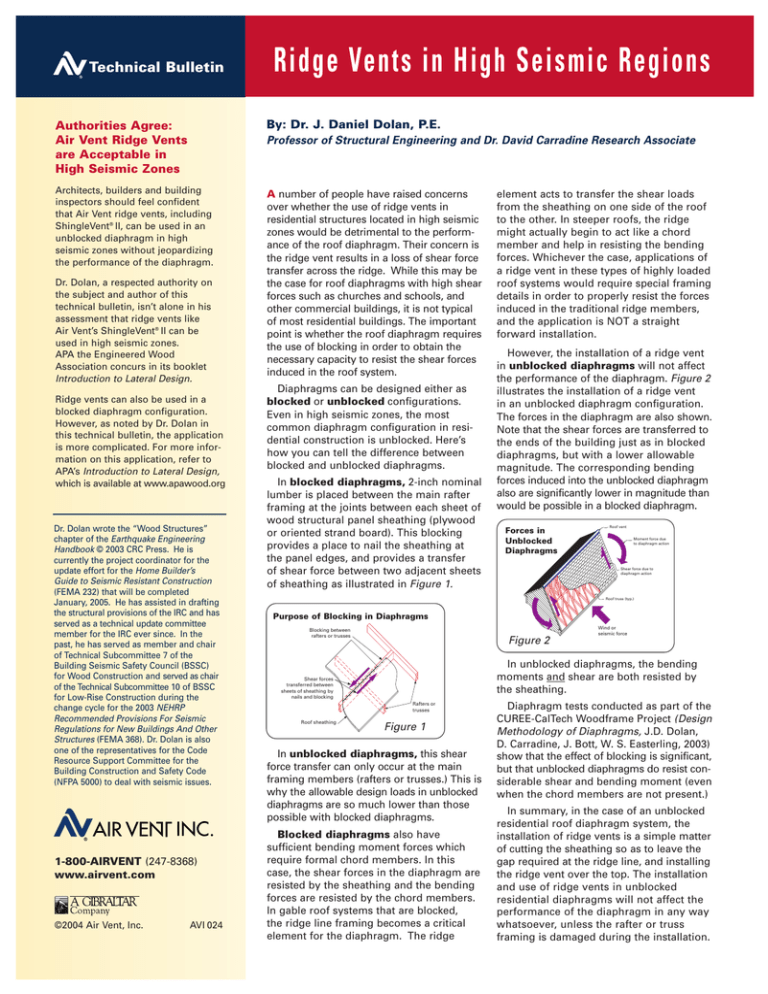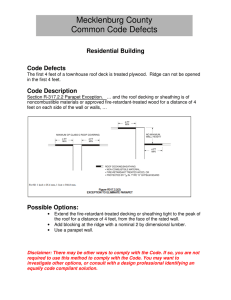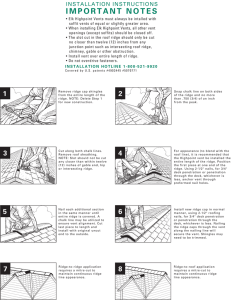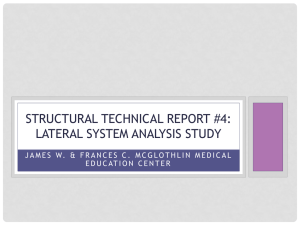Ridge Vents in High Seismic Regions
advertisement

Technical Bulletin Ridge Vents in High Seismic Regions Authorities Agree: Air Vent Ridge Vents are Acceptable in High Seismic Zones By: Dr. J. Daniel Dolan, P.E. Architects, builders and building inspectors should feel confident that Air Vent ridge vents, including ShingleVent® II, can be used in an unblocked diaphragm in high seismic zones without jeopardizing the performance of the diaphragm. A number of people have raised concerns over whether the use of ridge vents in residential structures located in high seismic zones would be detrimental to the performance of the roof diaphragm. Their concern is the ridge vent results in a loss of shear force transfer across the ridge. While this may be the case for roof diaphragms with high shear forces such as churches and schools, and other commercial buildings, it is not typical of most residential buildings. The important point is whether the roof diaphragm requires the use of blocking in order to obtain the necessary capacity to resist the shear forces induced in the roof system. Professor of Structural Engineering and Dr. David Carradine Research Associate Dr. Dolan, a respected authority on the subject and author of this technical bulletin, isn’t alone in his assessment that ridge vents like Air Vent’s ShingleVent® II can be used in high seismic zones. APA the Engineered Wood Association concurs in its booklet Introduction to Lateral Design. Ridge vents can also be used in a blocked diaphragm configuration. However, as noted by Dr. Dolan in this technical bulletin, the application is more complicated. For more information on this application, refer to APA’s Introduction to Lateral Design, which is available at www.apawood.org Dr. Dolan wrote the “Wood Structures” chapter of the Earthquake Engineering Handbook © 2003 CRC Press. He is currently the project coordinator for the update effort for the Home Builder’s Guide to Seismic Resistant Construction (FEMA 232) that will be completed January, 2005. He has assisted in drafting the structural provisions of the IRC and has served as a technical update committee member for the IRC ever since. In the past, he has served as member and chair of Technical Subcommittee 7 of the Building Seismic Safety Council (BSSC) for Wood Construction and served as chair of the Technical Subcommittee 10 of BSSC for Low-Rise Construction during the change cycle for the 2003 NEHRP Recommended Provisions For Seismic Regulations for New Buildings And Other Structures (FEMA 368). Dr. Dolan is also one of the representatives for the Code Resource Support Committee for the Building Construction and Safety Code (NFPA 5000) to deal with seismic issues. 1-800-AIRVENT (247-8368) www.airvent.com ©2004 Air Vent, Inc. AVI 024 Diaphragms can be designed either as blocked or unblocked configurations. Even in high seismic zones, the most common diaphragm configuration in residential construction is unblocked. Here’s how you can tell the difference between blocked and unblocked diaphragms. In blocked diaphragms, 2-inch nominal lumber is placed between the main rafter framing at the joints between each sheet of wood structural panel sheathing (plywood or oriented strand board). This blocking provides a place to nail the sheathing at the panel edges, and provides a transfer of shear force between two adjacent sheets of sheathing as illustrated in Figure 1. element acts to transfer the shear loads from the sheathing on one side of the roof to the other. In steeper roofs, the ridge might actually begin to act like a chord member and help in resisting the bending forces. Whichever the case, applications of a ridge vent in these types of highly loaded roof systems would require special framing details in order to properly resist the forces induced in the traditional ridge members, and the application is NOT a straight forward installation. However, the installation of a ridge vent in unblocked diaphragms will not affect the performance of the diaphragm. Figure 2 illustrates the installation of a ridge vent in an unblocked diaphragm configuration. The forces in the diaphragm are also shown. Note that the shear forces are transferred to the ends of the building just as in blocked diaphragms, but with a lower allowable magnitude. The corresponding bending forces induced into the unblocked diaphragm also are significantly lower in magnitude than would be possible in a blocked diaphragm. Forces in Unblocked Diaphragms Roof vent Moment force due to diaphragm action Shear force due to diaphragm action Roof truss (typ.) Purpose of Blocking in Diaphragms Blocking between rafters or trusses Figure 2 In unblocked diaphragms, the bending moments and shear are both resisted by the sheathing. Shear forces transferred between sheets of sheathing by nails and blocking Rafters or trusses Roof sheathing Wind or seismic force Figure 1 In unblocked diaphragms, this shear force transfer can only occur at the main framing members (rafters or trusses.) This is why the allowable design loads in unblocked diaphragms are so much lower than those possible with blocked diaphragms. Blocked diaphragms also have sufficient bending moment forces which require formal chord members. In this case, the shear forces in the diaphragm are resisted by the sheathing and the bending forces are resisted by the chord members. In gable roof systems that are blocked, the ridge line framing becomes a critical element for the diaphragm. The ridge Diaphragm tests conducted as part of the CUREE-CalTech Woodframe Project (Design Methodology of Diaphragms, J.D. Dolan, D. Carradine, J. Bott, W. S. Easterling, 2003) show that the effect of blocking is significant, but that unblocked diaphragms do resist considerable shear and bending moment (even when the chord members are not present.) In summary, in the case of an unblocked residential roof diaphragm system, the installation of ridge vents is a simple matter of cutting the sheathing so as to leave the gap required at the ridge line, and installing the ridge vent over the top. The installation and use of ridge vents in unblocked residential diaphragms will not affect the performance of the diaphragm in any way whatsoever, unless the rafter or truss framing is damaged during the installation.




